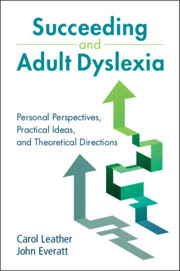Book contents
- Succeeding and Adult Dyslexia
- Succeeding and Adult Dyslexia
- Copyright page
- Contents
- Figures
- Tables
- Acknowledgements
- Part I
- Part II
- 4 Strategies Contributing to Success
- 5 Literacy and Language Issues and Strategies
- 6 Effective Communication
- 7 Dyslexia in the Workplace
- 8 Organisational Influences on Success
- 9 Personal Perspectives of Dyslexia and Career Success
- 10 Summary and Conclusions
- References
- Index
4 - Strategies Contributing to Success
from Part II
Published online by Cambridge University Press: 11 January 2024
- Succeeding and Adult Dyslexia
- Succeeding and Adult Dyslexia
- Copyright page
- Contents
- Figures
- Tables
- Acknowledgements
- Part I
- Part II
- 4 Strategies Contributing to Success
- 5 Literacy and Language Issues and Strategies
- 6 Effective Communication
- 7 Dyslexia in the Workplace
- 8 Organisational Influences on Success
- 9 Personal Perspectives of Dyslexia and Career Success
- 10 Summary and Conclusions
- References
- Index
Summary
Chapter 4 explores how the ideas discussed in the previous three chapters can be used for strategy development, which can help reframe the workplace challenges associated with dyslexia and identify personal solutions. This chapter initially explores positive and negative aspects of dyslexia as part of a further discussion of developing self-understanding of individual skills/abilities. It also includes a model to explain the difficulties experienced by adults with dyslexia in different contexts, and the role of metacognitive skill in mitigating these difficulties. A focus on the strategies that individuals can use to support success will involve outlining issues related to (i) understanding your dyslexia and yourself, (ii) being strategic, and using metacognitive and executive skills, (iii) never underestimating memory as it may be as good as that of others, (iv) making the most of your time through planning, goal setting and time management, (v) maximising motivation to build self-efficacy and confidence, (vi) seeking support from your social ecologies to find out how others can help, and (vii) promoting yourself positively, including disclosing dyslexia when appropriate.
Keywords
- Type
- Chapter
- Information
- Succeeding and Adult DyslexiaPersonal Perspectives, Practical Ideas, and Theoretical Directions, pp. 89 - 137Publisher: Cambridge University PressPrint publication year: 2024

